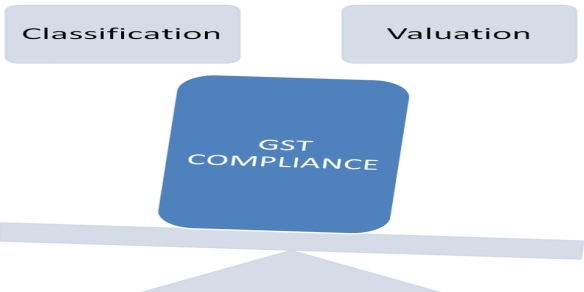GST Compliance was founded on the bed-rock of balance between Classification and Valuation. GST is applicable on each and every supply transaction. In this regard, there were several misnomers among professionals and assessees w.r.t GST Rate applicability on taxable supplies viz.
♠ Whether GST rate needs to be applied individually when separate line item of charges are provided in tax invoices or bill of supply??
♠ Whether Separate GST registration need to be obtained for any expenses incurred by the supplier on behalf of buyer in relation to any supply. When the same is collected separately in the tax invoice/ bill of supply from the buyer??
♠ Do the concept of Composite supply and Valuation principles laid down in Section 8 read with Section 15 of CGST Act lost its relevance in the above mentioned scenarios?
♠ How classification issues were dealt with in Central excise, Service Tax Act, Value Added Tax and Service Tax regime?

These issues needs to be understood in right direction and right approach otherwise it may invite unnecessary tax litigations. In this article let us address these issues in detail.
Normally, applicable tax rates are applied on product sold or services rendered by the assessee. However, as part of supply, supplier may incur various expenses in relation to supply viz., handling charges, packing charges, transportation charges, insurance charges, commission charges etc….
Now the issue for discussion is what rate needs to be applied for aforesaid incidental expenses when they are shown as separate line item in invoices? Whether supplier needs to apply applicable rate on goods sold/ service rendered or individual rates on such line items example handling charges -18%, transportation charges – 5% etc.,
Page Contents
Deemed Sales under Article 366(29A) of Indian Constitution:
It is pertinent to note here that in pre-GST regime, Article 366(29A) by deeming fiction permitted bifurcation of goods or services in relation deemed sales transactions and allowed to pay applicable taxes on goods component & service component respectively. (BSNL vs. UOI 49 VST 98). However, in Post-GST regime, the transactions stipulated under Article 366(29A) are falling either under Service or goods of Schedule II of CGST Act. So there shall be no bifurcation of goods or services even for deemed sale transactions stipulated under Article 366(29A).
Apart of deemed sale transactions, even during Pre-GST regime, there shall be no artificial bifurcation on sales other than deemed sale transactions even if seller provided separate line item of charges in sale or service invoices.
Mode of disposal of cases w.r.t sale turnover computation in Pre-GST regime:
However, many assessees during Pre-GST regime, chosen to ignore incidental and non monetary expenses in Sales turnover computation. They charged these expenses as separate line item in sale invoices and not paid applicable taxes on the same stating that these charges were in nature of service/ non sale transactions. But there is plethora of cases settled in Supreme Court and Various High courts on items to be included or excluded in Sale transactions. Following are few land mark judgments which addressed these issues:
| Particulars | Case Law | Ratio of Case Law |
| Freight | Hindustan Sugar Mills 43 STC 13 (SC) | When terms of agreement stipulates that the risks and rewards are transferred at customer place (FOR Destination sale) then sale price is inclusive of freight and supplier is liable to pay tax on freight charges at the applicable rate of commodity |
| Packing Charges | Commissioner of Sales Tax, U.P. Vs. Rai Bharat Das & Bros. 1989 AIR 315 |
Packing charges incurred for putting the goods in a deliverable state form part of the sale price.
Even if Packing charges shown separately in the sale bill Accordingly, applicable rate of commodity is applied on packing charges. |
| Insurance Charges | Hyderabad Industries Ltd Vs State of AP 4 APSTJ 103 | insurance charges collected in the sale bills form part of the turnover. |
| Collection of delay charges | Indian Drugs & Pharmaceuticals Ltd , Hyd Vs. State of AP 11 APSTJ 123 |
Amounts collected by the bankers for delayed lifting of the documents and credited to the assessee is a pre-sale expenditure and forms part of sale price or turnover as the case may be. |
| Handling Charges | Kirlampudi Sugars Ltd., Pithapuram Vs. State of AP 14 APSTJ 115 |
Handling charges collected by means of debit notes form part of the sale price and are exigible to tax. |
| Subsidy | Neyveli Lignite Corp 124 STC 586a (SC) | if subsidy by reimbursement not relatable to sale of goods do not form part of taxable turnover |
| Mazagon Dock 127 ECR 268 (SC) | subsidy received from buyer form part of additional consideration and taxable under the act | |
| Discount | Advani Oerlikon 45 STC 32 (SC) | trade discount is deductable from taxable turnover |
In light of the above case laws, the sale turnover computation modified from time to time in Central Sales Tax Act, General Sales Tax, VAT Act. The same was appropriately incorporated in GST regime under Section 15 of CGST Act. The relevant gist of the same was as under:
Section 15: Value of Taxable Supply
(2) “The value of supply shall include:
(a) any taxes, duties, cesses, fees and charges levied under any statute, other than GST
(b) Amount supplier is liable to pay but which has been incurred by the recipient.
(c) Incidental expenses, such as, commission and packing, charged by the supplier
(d) Interest or late fee or penalty for delayed payment
(e) Subsidies directly linked to the price excluding subsidies provided by the Govt
(3) The value of the supply shall not include any pre agreed discount/ after supply discount effected in terms of agreement.”
On the obtained Value of supply under Section 15, relevant rate need to be levied in terms of Section 9 of CGST Act.
Section 9: Levy and Collection
“1) Subject to the provisions of sub-section (2), there shall be levied a tax called the central goods and services tax on all intra-State supplies of goods or services or both, except on the supply of alcoholic liquor for human consumption, on the value determined under section 15 and at such rates, not exceeding twenty per cent., as may be notified by the Government on the recommendations of the Council and collected in such manner as may be prescribed and shall be paid by the taxable person.”
Rescue of Section 8 for determining applicable rates:
Similarly, Section 8 of CGST Act has explicitly clarified that when there are two or more taxable supplies in a transaction then tax liability of the same shall be determined based on whether they are composite supply (naturally bundled) or mixed supply transactions (unnaturally bundled).
For composite supply i.e. naturally bundled transactions, GST rate of principal supply needs to be applied on composite supply transactions. For example if Air Conditioner is sold for Rs. 30,000/- with breakup of Rs. 25,000/ for Air Conditioner and Rs. 5,000/-for transportation and Installation in tax invoice. Since, it is a naturally bundled composite supply transactions, GST rate of Principal supply shall be applied on entire invoice value i.e. GST Rate of Air Conditioner shall be applied on entire 30,000/- invoice value.
The aforesaid concept of Section 8 is in line with Section 15 of CGST Act and aforementioned land marks settled in Supreme Court and Various High Courts.
Connecting Dots:
- When there are two or more supply transactions, for determing tax liability we need to analyse whether such supplies are composite or mixed supplies and determine the tax liability accordingly (Section 8 of CGST Act).
- Similarly, in terms of Section 9 read with Section 15 of CGST Act, GST shall be levied on value of Supply determined under Section 15. Therefore, the items to be included and excluded shall be given due care before determing applicable rate.
- It would be practically difficult and illogical to interpret that for each separate line item of composite supply separate rate is applicable. Because in such scenarios supplier has to obtain separate registration for each and every breakup of supply transaction which is not the intention of legislature.
(the author of this article can be reached at prudhvitadepalli@gmail.com)





